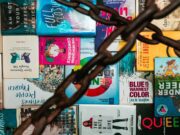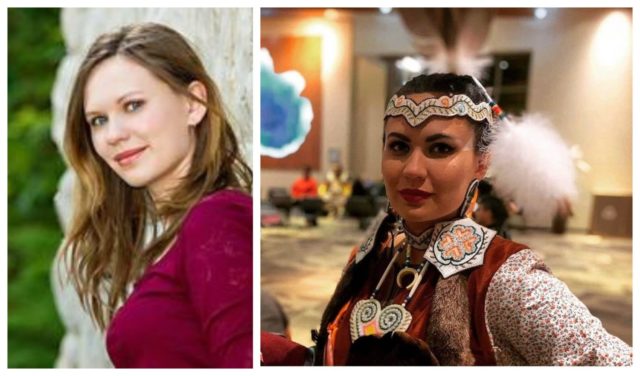Early in 2020, an Indigenous artist urged the owners of a new music venue in town to change its name.
It was called The Winnebago, after the street on which it stands. Many Indigenous people and allies let the owners know that wasn’t the best name for a white-owned music venue. One of them was nibiiwakamigkwe, also known as Kay LeClaire, a founding member and co-owner of the queer Indigenous artists’ collective giige, and budding leader of Madison’s Indigenous arts community.
It took several months, but the venue eventually relented and rebranded as The Burr Oak.
“I’m glad the owners have decided to no longer profit from the identities of Indigenous peoples,” LeClaire wrote in an editorial for Our Lives Wisconsin. “I’m glad the name is going, but I’m not happy the institutions that allowed it to be stolen in the first place remain. For over 500 years, Indigenous Peoples have not controlled our narratives and representations. Our exclusion has been built into inclusion for others.”
One problem with that narrative: LeClaire wasn’t Indigenous, and was, in fact, profiting from the identities of Indigenous peoples.
Since at least 2017, Kay LeClaire has claimed Métis, Oneida, Anishinaabe, Haudenosaunee, Cuban and Jewish heritage. Additionally, they identify as “two-spirit,” a term many Indigenous people use to describe a non-binary gender identity. In addition to becoming a member and co-owner of giige, LeClaire earned several artists’ stipends, a paid residency at the University of Wisconsin, a place on the Missing and Murdered Indigenous Women Task Force and many speaking gigs and art exhibitions, not to mention a platform and trust of a community – all based on an ethnic identity that appears to have been fully fabricated.
LeClaire declined to be interviewed, but provided a statement by email to Madison365.
“I am sorry,” they wrote. “A lot of information has come to my attention since late December. I am still processing it all and do not yet know how to respond adequately. What I can do now is offer change. Moving forward, my efforts will be towards reducing harm by following the directions provided by Native community members and community-specified proxies. Currently, this means that I am not using the Ojibwe name given to me and am removing myself from all community spaces, positions, projects, and grants and will not seek new ones. Any culturally related items I hold are being redistributed back in community, either to the original makers and gift-givers when possible or elsewhere as determined by community members. Thank you.”
LeClaire declined to answer follow-up questions, including who gave them their Ojibwe name and what information came to their attention.
“Hobbyist genealogist” uncovers “pretendian”
The deception first came to light in late November on New Age Fraud Forum, a message board on a relatively obscure website. User AdvancedSmite posted about LeClaire, including copious evidence of LeClaire’s claims as well as evidence of their true genealogy.
AdvancedSmite spoke with Madison365 but asked to remain anonymous for fear of retribution for exposing LeClaire and several other “pretendians.”
AdvancedSmite, who is also of Indigenous heritage, said they first became aware of LeClaire through a Facebook ad for an upcoming talk on Indigenous feminism at which LeClaire was going to speak. It identified LeClaire as nibiiwakamigkwe, which AdvancedSmite found unusual; the single given Ojibwe name is “typically something that would just be used in ceremony or with other people who are Ojibwe or a part of your community,” they said.
But they also said they’re aware that some Indigenous people have recently been using those given names more publicly as a means to embrace and celebrate their heritage. While unusual, it wasn’t necessarily a red flag.
Still, AdvancedSmite did some googling, and connected the Ojibwe name to LeClaire, which is “a common Native American last name.” AdvancedSmite also noticed through online posts that LeClaire seemed to often identify as Anishinaabe, which was also unusual.
“Our band names are so important, so I tend to be suspicious when someone just says Anishinaabe,” AdvancedSmite said.
Also a “hobbyist genealogist,” AdvancedSmite used online records and resources to find LeClaire’s true lineage – German, Swedish and French Canadian. Once they had that more or less confirmed – and were sure there wasn’t another Kathryn LeClaire of the same age – they posted on the New Age Fraud Forum.
AdvancedSmite said they have no prior connection to LeClaire nor to the Madison Indigenous community, and are not personally involved in this case.
“I have a skill and I saw something and I did what I could,” they said.
“A gut punch”
It took almost a month for the New Age Fraud Forum post to reach the Madison community, when clients started sending the link to giige members.
“I was so relieved that someone else had called it out and I didn’t have to. I’ve had my suspicions, but I didn’t have anything confirmed,” said tattoo artist Nipinet Landsem. “At first, I was relieved. And then I moved into every human emotion known to man. I am horrified, I’m upset. We’ve already had so much taken away from us. American society is built off of things that have been stolen from Native and Black people. Stolen land, stolen resources, stolen labor, and white people think it’s okay to just continue stealing from us.”
“This causes a lot of harm, first of all, because it is a non-native person taking and making not just a profit, but making a name for themselves through our traditions, which is extra harmful because for so many years, these traditions were illegal,” said Arvina Martin, a member of the Ho-Chunk Nation and former Madison alder. “To take our traditions, and then make a name for your individual self is completely anathema to (our) values. And the fact that again, this was illegal for so long, and it just really twists the knife to see that happen. It’s the worst when it’s someone trusted.”
“I’m just stuck. I’m stuck in a weird pool of emotions that I’m struggling to process,” said Kristie Goforth, a member of the Sault Tribe of Chippewa Indians and candidate for Monona mayor. “I’m fighting the part of me that wants to say, ‘here’s a white person who’s betraying us again, another white person that can’t be trusted.’ I don’t want to group them all into a pool of people who can’t be trusted, because that’s just not the case. But that’s how I feel right now a little bit, just because it’s so raw.”
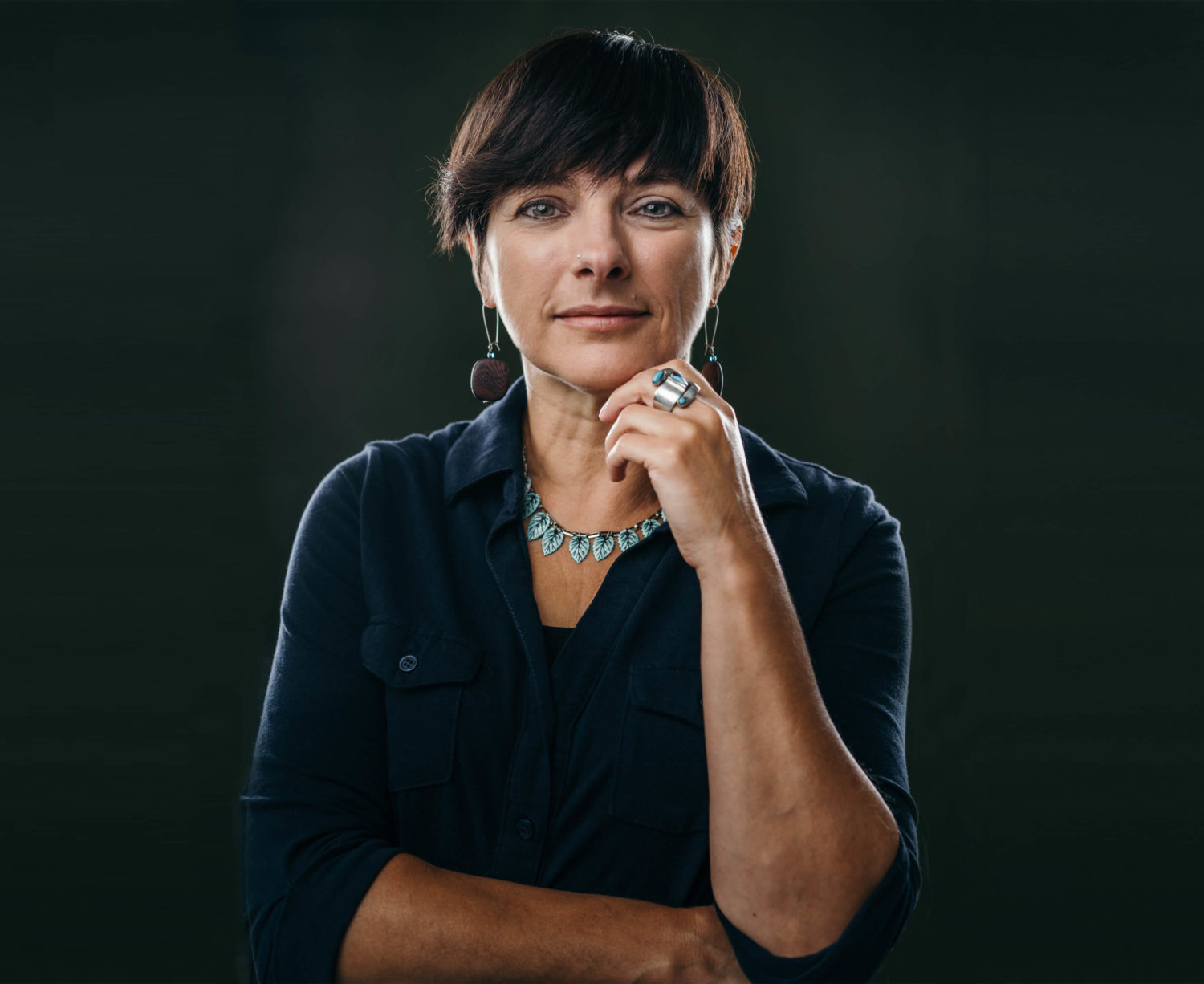
Goforth said she considered LeClaire a friend, and was excited about the 28-year-old’s prospects.
“I am a woman in my 50s. One of the reasons I was excited about seeing (them) come on the scene was this young (person), strong, bold and loud, really just pushing conversations forward. I really appreciated that,” Goforth said. “I love to empower younger women. I think that’s important that we do that in our community. I just really wanted to see … them shine their light here and, and help move conversation and education forward. That’s what’s so hard. It’s just such a gut punch.”
Goforth said the white community in Madison is especially vulnerable to this kind of deception.
“There’s this appetite in Madison to just really want (diversity) and want to believe it so badly,” she said. “It’s like a craving for it. We’re craving culture here. And so then when someone like Kay comes forward, dressed as she did, and, you know, really being a loud voice for Native issues, it was fully consumed.”
Suspicions raised
LeClaire graduated from Hamilton High School in Sussex, Wisconsin, where they were known as Katie Le Claire, in 2012 (despite later telling a Capital Times reporting intern that they were raised in Northern Wisconsin). They apparently attended the University of Wisconsin and in the summer of 2018 married fellow Hamilton alum Adam Pagenkopf, a research specialist at UW.
In a post on their now-deleted Facebook account during the wedding planning, LeClaire referred to themself as “a 20-something white woman.” By 2019, however, they were identifying as Indigenous enough to cofound the giige collective with Landsem and several others.
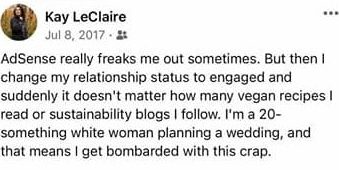
Several members of Madison’s Indigenous community who befriended or worked with LeClaire had small suspicions, but explained them away or gave LeClaire the benefit of the doubt.
“They claimed Métis (heritage)”, said Landsem, who is a member of the Manitoba Métis Federation. “I knew they were not. They didn’t know anything about being Métis. They told me incorrect things a lot. My assumption for the whole like last few years has been … they’re probably a disconnected descendant who has a complex about that. That’s what I assumed because I was giving them the benefit of the doubt.”
“I thought it was interesting how (they) often wore, it wasn’t like full regalia, but (they were) often wearing furs and clearly Indigenous-made clothing and it was almost like flying a flag. ‘Hi, I’m an indigenous woman.’ You don’t see that very often,” Goforth said. “Really, I don’t see that in my circles. I chalked that up to part of (their) role at the UW, bringing the exposure of culture forward, but now I look at it, and it was literally like a costume. It’s just so painful.”
Goforth also said LeClaire mistook a porcupine quill basket for a pine needle basket – something Goforth said she wouldn’t attribute to simply misspeaking. Rather, Goforth said she assumed LeClaire may have been somewhat distanced from their Indigenous heritage and was just now reconnecting.
“So much of our family records and our history is not available or it’s been damaged. I just kind of chalked all of it up to that,” Goforth said.
Landsem also noted LeClaire’s frequent tanning, any mention of which Landsem said would bring accusations of colorism from LeClaire. Landsem said LeClaire used their high school senior photo as evidence that LeClaire’s mother forced them to “bleach” their skin and hair.
“We know the harm that colonialism has done. We know how many people are disconnected or didn’t grow up traditional,” Landsem said. “They didn’t grow up with the culture. We know how many people are like that out there, and we want them to come back. If you go to someone and you say, ‘Hey, this is who I am, this is where I’m from,’ they’ll probably trust you … I grew up really privileged, I’m Native, I know where my family’s from. I didn’t grow up on the rez. I didn’t grow up in poverty. Who am I to question other people’s experience of those things?”
Following the money
It’s not yet known exactly how much money LeClaire made by claiming Indigenous heritage, but it’s clear they worked their way into many institutions and exhibitions.
They were Community Leader in Residence at the University of Wisconsin School of Human Ecology Center for Design and Material Culture from March to December 2022, and were paid $4,876.56, which came from private giving and grants.
In a statement emailed to Madison365, the School of Human Ecology said LeLclaire had resigned their position on December 29.
“We are deeply concerned about allegations that a community member with whom we have partnered misrepresented their identity and engaged in disingenuous actions,” the statement read. “There is a long and painful history of erasure and cultural appropriation in the U.S., which has had an immense impact on the lives of Indigenous people. These latest allegations are a disturbing reminder of how this persists today … We greatly value our relationships with Native students, faculty, staff and community members in Wisconsin and across the nation. We strive to uplift others and make sure our school is a place where people of all backgrounds and identities know they belong. We remain steadfast in our commitment to creating educational pathways for Native students, faculty, staff and community members and invite feedback on meaningful ways to continue to support this commitment. As the layers of this situation unfold, we are committed to understanding and learning from it and fostering healing for all involved.”
LeClaire provided a “jingle dress” to an exhibit at Overture Center, where patrons wrote thoughts and prayers onto small circles of fabric, which LeClaire then fashioned into the bells that adorn the traditional Ojibwe garment. However, LeClaire didn’t make the dress; they commissioned it from a person who makes powwow regalia as a “rush order” just before the exhibit opened in September 2021.
The person who made the dress asked not to be identified, but said they didn’t know that LeClaire had represented the dress as LeClaire’s own creation until last week. The maker also said she declined to work with LeClaire on future orders because something seemed “off”.
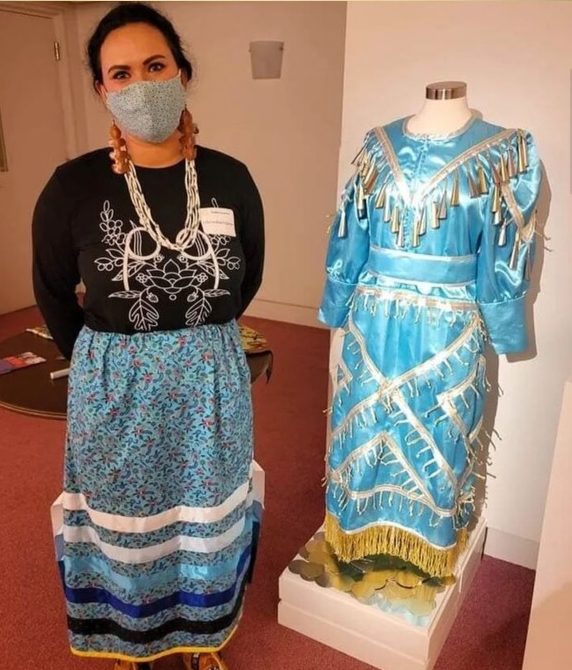
“We were shocked and disappointed by the evidence that an artist misrepresented themself and their work, and we plan to fully investigate the issue. Overture Center would never knowingly work with an artist that misrepresented their credentials or background. We are reaching out to the Indigenous community to apologize, and we also extend our apologies to the community as a whole,” Overture Center representative Emily Gruenwald wrote in an email to Madison365. “While we are diligent in our efforts to research artists, it appears that this person went to great lengths to deceive Overture Center and ultimately our community. We will be contacting the person who made the dress to work with them to ensure they receive the proper credit and compensation for their work. We also will inform other performing arts centers about this situation so that it doesn’t happen to other communities.”
LeClaire also purchased birch baskets from a crafter who is not Indigenous, then apparently scratched that person’s name off and replaced it with their own, according to photos provided by Landsem. Landsem said LeClaire gifted some of these baskets to friends; if they sold any, it could be a violation of the Indian Arts and Crafts Act of 1990.
LeClaire received a $300 stipend for contributing to the Collateral Damage exhibition in May 2022, organizers said.
LeClaire sold, or intended to sell, at least one deer leather bag to someone through Instagram, clearly indicating they would make the bag; however, the bags they advertised on social media were made by someone else.
“I don’t blame any of the Native organizations that Kay works with,” Landsem said. “We have all been blindsided and taken advantage of by a fraud. We’re all hurting. And I think the larger community needs to take responsibility for how this was able to happen. I’m currently focused on keeping myself and my community safe from further harm by this person and by other institutions in Madison. I want accountability.”
“A fight for our future”
It’s unclear what, if any, legal ramifications may be in store for LeClaire. LeClaire has signed away their stake in giige, Landsem confirmed.
Community members want accountability one way or another.
“Kay needs to come back, take accountability, face up to what they did and make sincere apologies to every single person that they harmed, every nation that they claimed, their own mother for pretending that she was somebody other than who she is,” Landsem said. “They need to accept the blame, apologize, pay reparations, do something to make it right.”
“They are a human being, and it’s clear they must need help,” Goforth said. “I’m coming from a place of compassion. I cared for them. I hope they get the help they need.”
“Everybody’s still trying to piece together what they knew about their friend and fellow activist, fellow community member,” Martin said. “I think it’s gonna take a while. I’d rather it take a while, and we figure out how to do things in a good way, then rush to any kind of particular action if folks aren’t ready.”
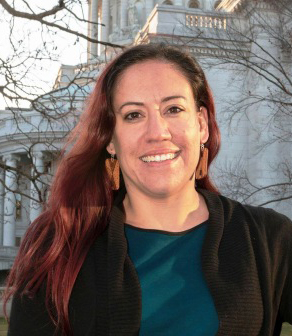
AdvancedSmite, the New Age Fraud Forum user who uncovered the deception, said the appropriation of Native identity is a larger issue than any one person.
They noted that the self-identified Native American population grew by 85% between the 2010 and 2020 census, from just over five million to well over nine million.
“That’s not population growth,” they said. “It’s a major issue. The government needs to ask if you are an enrolled member of a federally recognized tribe.
“You can’t assume … that Kay LeClaire is an isolated incident … the pretendian problem is a long term, strategic issue,” they wrote in a later email to Madison365, adding that people who falsely claim Indigenous heritage are then passing that false claim on to their children, who may unwittingly accept it, perpetuating a falsehood through generations. “It’s a fight for our future and identity.”
NOTE: This story has been corrected. Multiple sources told Madison365 that after the Overture Center exhibit, LeClaire donated the dress to the Helen Louise Allen Textile Collection at the UW School of Human Ecology. SOHE told us in an email Wednesday that isn’t the case.


















